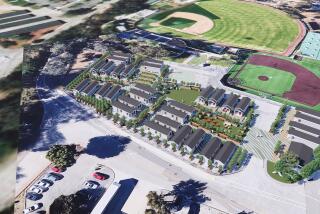San Marcos Wins Redevelopment Case
- Share via
The city of San Marcos acted properly when it included in its redevelopment plans two separate neighborhoods--one around the new Cal State San Marcos campus and another at the site of a proposed trash-to-energy plant--a Vista Superior Court judge ruled Wednesday.
In a straightforward, two-page ruling, Judge Terry O’Rourke said the city offered sufficient evidence in showing that the two neighborhoods are economically blighted.
Escondido resident and businessman Jack Leach had challenged the plans, arguing that neither area was blighted because the land was, for the most part, undeveloped and would be an inappropriate recipient of redevelopment funds.
If Leach had prevailed, the city stood to lose $60 million over the next 25 years--money it hopes will eventually be generated in property taxes in those two redevelopment areas that will, in turn, finance public improvements there and elsewhere in the city.
Leach said Wednesday he will probably appeal O’Rourke’s ruling.
“If the city’s saying they can’t develop those areas without redevelopment funds, something’s wrong, or I simply don’t understand the law,” Leach said.
The city argued that the land would not be privately developed without the city’s intervention because the cost of providing streets, sewers and other public works would be prohibitive to a private developer.
Leach’s attorney, Jeanne MacKinnon, had argued in court Tuesday that the city was abusing state redevelopment laws by trying to use property-tax revenue to help develop land that should not be considered economically blighted just because it is vacant.
“Our position was that the infrastructure may be needed for the future use of the parcel, but it’s not needed now. There’s not a problem until the land is developed, and the infrastructure is needed to support it. But that’s not sufficient reason to include it in redevelopment now,” MacKinnon said.
John Morris, the city’s attorney, successfully argued to the judge that the public improvements need to come first to make the land developable, and that financing those improvements is an appropriate task for the city’s redevelopment agency.
“The land as it now stands doesn’t present an attractive economic investment for a developer,” Morris said Wednesday. “This property is especially ill-served by the existing infrastructure.”
Morris said the city’s logic does not suggest that the city would, at its own expense, take on the obligation of financing public improvements for other vacant parcels in the city--only in those cases where the land, perhaps because of its distance from existing utilities and streets, is simply not attractive to developers.
Under the state’s redevelopment laws, a city can declare neighborhoods in need of redevelopment if they are shown to be physically or economically blighted in a legal, technical sense.
More to Read
Sign up for Essential California
The most important California stories and recommendations in your inbox every morning.
You may occasionally receive promotional content from the Los Angeles Times.










